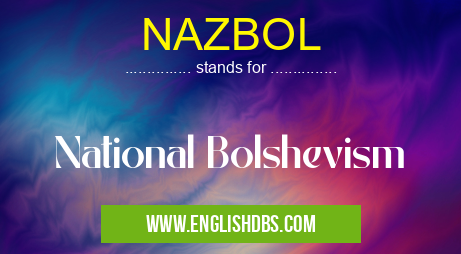What does NAZBOL mean in POLITICS
National Bolshevism is a political movement of left-wing and right-wing nationalists who have combined forces in order to oppose what they view as the globalization and global imperialism of Western countries. National Bolsheviks are united by their support for a nationalist and authoritarian form of government, while rejecting the liberal values of democracy and international cooperation. This movement has been largely centered in Russia, though some National Bolshevik ideas have spread to other parts of the world, such as Eastern Europe and parts of Asia. It is worth noting, however, that National Bolshevism is not an organized political party or movement in any nation or region.

NAZBOL meaning in Politics in Governmental
NAZBOL mostly used in an acronym Politics in Category Governmental that means National Bolshevism
Shorthand: NAZBOL,
Full Form: National Bolshevism
For more information of "National Bolshevism", see the section below.
» Governmental » Politics
What Does NAZBOL Mean?
The acronym "NAZBOL" stands for "National Bolshevism," which is a term used to describe a combination of left-wing politics and right-wing nationalism. This hybrid ideology seeks to combine elements from both sides in order to create a more powerful government than traditional forms of either left or right-wing politics alone can provide. National Bolsheviks typically advocate for authoritarian government policies that reject liberal values such as democracy and international cooperation while also promoting strong national identity through social programs and economic policies that prioritize domestic interests over foreign concerns.
What Is NAZBOL's Role In GOVERNMENTAL?
National Bolshevism has had a complex role within governmental systems around the world. In Russia in particular, many believe that aspects of National Bolshevik ideology influenced the Russian Revolution of 1917 and subsequent Soviet Union regimes up until its collapse in 1991. During this time, many features associated with National Bolshevik ideology were incorporated into the political landscape including heavy reliance on state control, militaristic patriotism, anti-capitalist rhetoric, strong centralization around leaders like Joseph Stalin, as well as scapegoating certain groups (such as ethnic minorities) in order to drum up support for ideological aims circulating at the time. Furthermore, even after the dissolution of the Soviet Union there remain present today within modern Russian politics certain tendencies towards authoritarian rule which some suggest derive from aspects inherent within National Bolshevik philosophy.
What Does NAZBOL Stand For?
As discussed above, NAZBOL stands for "National Bolshevism," a term used to identify a type of political ideology which combines elements from both left-wing and right-wing politics with an emphasis on strong national identity under an authoritative governing system that rivals other forms of government (including democracy).
Essential Questions and Answers on National Bolshevism in "GOVERNMENTAL»POLITICS"
What is National Bolshevism?
National Bolshevism is a far-left Russian political ideology that combines nationalist and revolutionary symbolism with elements of the Soviet legacy. It emphasizes the shared history between Russia and other former USSR countries, and focuses on getting rid of bourgeois factions in society.
What are the core beliefs of National Bolshevism?
National Bolshevism has three main tenets: anti-capitalism, anti-imperialism, and anti-fascism. The ideology encourages radical economic reform, calls for the redistribution of wealth from capitalist countries to the poorer nations of the world, and seeks to reject any form of aggression or oppression against people.
How did National Bolshevism come about?
National Bolshevism was first introduced in Russia in 1918 with the emergence of the Bolshevik movement. It coalesced around ideas developed by intellectuals such as Nikolai Ustrialov, who proposed an alternate vision for Communism that embraced nationalism instead of international socialism.
Who founded National Bolshevism?
The ideological roots can be traced back to Nikolai Ustrialov and his ideas about nationalism and Socialism during post-revolutionary Russia. Other foundational figures include Lev Kaliaev and Nikolai Osinskii, who helped shape its more modern incarnation in the early 2000s.
What type of government does National Bolshevism advocate for?
The political system advocated by National Bolshevism is authoritarian, often associated with Stalinist policies from Soviet times. This includes state control over certain economic areas such as banking and industry, as well as social policies relating to healthcare and education that favor a more equal distribution between citizens.
Are there any active parties affiliated with the philosophy?
Yes; some Russian political parties have adopted certain aspects of National Bolshevism into their platforms. These include major parties such as United Russia and Just Russia as well as smaller movements like Rodina (Motherland) Party and Red Youth Vanguard Party.
Are intellectual activities encouraged within this movement?
Yes; while National Bolsheviks focus mainly on politics, they also encourage individuals to engage in intellectual inquiry into various topics including history, sociology, economics, philosophy ,etc., so long as it can help further their cause.
What tactics do they use to achieve their goals?
National Bolshevik tactics involve unifying progressive forces behind popular demands for change while simultaneously rejecting authoritarian solutions imposed by outside powers or bureaucrats in local governments. They believe that direct action from grassroots movements offer more effective solutions than those coming from traditional politicians or centralized leaderships structures.
Final Words:
In conclusion it can be said that National Bolshevism is an influential yet controversial form of political thought which combines elements from both sides on the ideological spectrum while promoting nationalism above all else through taking advantage of mobilized populations by using anti-capitalist rhetoric or drawing upon militaristic symbols. Many believe that aspects from this highly contested brand of thinking were important components throughout certain periods in Russian revolutions while also having implications even today when looking at current trends in Russian polity. Regardless if one agrees with this kind of thinking or not it is clear that understanding what NAZBOL means provides valuable insight into various aspects affecting contemporary geopolitical affairs.
